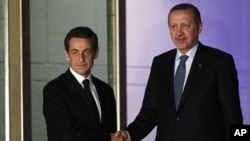French President Nicolas Sarkozy says he maintains his opposition to Turkey's membership in the European Union but has proposed the Muslim-majority nation instead become a privileged partner of the 27-member bloc. During a brief visit to Turkey Friday, Sarkozy expressed his belief that a compromise could be worked out. But Ankara has ruled this out, saying it is only interested in full membership.
Sarkozy arrived in the Turkish capital, Ankara, in his role as the current head of the Group of 20 leading and emerging economies. Even before his arrival, though, a fierce diplomatic exchange mired his visit in controversy. In an interview with a Turkish news channel ahead of his visit, Sarkozy said Turkey is part of the Middle East rather than Europe. Turkish Prime Minister Recep Tayyip Erdogan strongly criticized the French president for the brevity of his six-hour visit, while President Abdullah Gul chastised his French counterpart for his opposition to Turkey's EU accession bid.
Gul, speaking at a joint press conference with Sarkozy, said he told the French leader all EU members should contribute in a positive way to the accession process. Gul insisted EU membership remains a priority for Turkey, saying this is a very sensitive subject for his country and that "artificial obstructions" must not hinder Ankara's accession talks.
Sarkozy is currently vetoing five out of 35 membership chapters Turkey must complete to join the EU. The French leader's strong opposition to Turkey's membership bid has been responsible in part for bringing the process to a virtual standstill. Sarkozy acknowledged the two countries' separate views, but said they will continue to work together.
Turkish leaders voiced frustration over France's objections, but stressed the benefits to both sides of close ties, with Gul saying there is great potential for expanding the current $16 billion in bilateral trade. Observers say French business leaders are lobbying hard for Sarkozy to mend relations with Turkey. French companies view the booming Turkish economy as a key market, especially the current large state contracts on offer, particular in the field of energy. Sarkozy tried to play down the differences over the EU, but did not back down.
Sarkozy said the two leaders discussed the issue as statesmen, trying to understand both points of view. He said the aim is to find the right direction for the future, one that will not lead to the destabilization of Europe, nor the negation of democratic changes in Turkey.
The French president, looking for common ground, said the two leaders agreed on the need for an international humanitarian effort to deal with the turmoil in Libya. But even here, differences emerged, with Ankara opposing Sarkozy's call for international sanctions against Libya.
France Still Opposes EU Membership for Turkey
- By Dorian Jones




